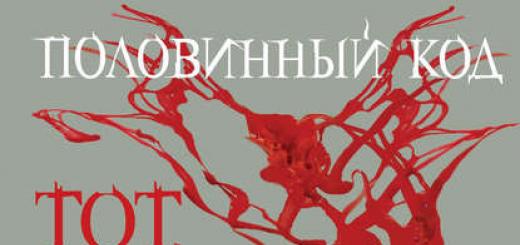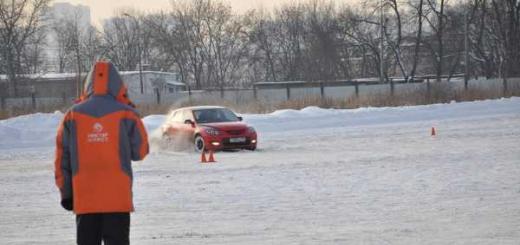On December 7, a meeting of the National Accreditation Council was held to make an independent collegial decision on the quality educational programs two federal universities and the possibility of comparing their level with the level of leading European universities: Immanuel Kant Baltic Federal University and Northern (Arctic) Federal University named after M.V. Lomonosov.
"To have a future, you have to be willing to do something new."
P. Drucker
Today, Russian higher education is facing a whole range of challenges and tasks. This is a change in the legislation on education, and the impact of the demographic situation, and the practical implementation of the provisions of the Bologna process, which changes the entire structure and content educational process, as well as technology for assessing its quality. This includes the search for optimal forms of cooperation with employers.
In this regard, the problem of the quality of higher education in Russia is the most discussed one. In many higher educational institutions Specialties are duplicated in each region, but in each of them the quality is completely different. The fact that the vast majority of universities successfully pass the state accreditation procedure according to the established formal criteria indicates that it has become a mass phenomenon, has ceased to be a mechanism for motivating universities to develop and improve the quality of education - as for a student: pass an exam and forget!
Education Act" Russian Federation provides, along with the state accreditation of institutions, the existence of a procedure for public and professional accreditation, the results of which are considered during the state accreditation of the university. This dictates the need to develop procedures for public and professional accreditation, the creation of accreditation organizations and independent collegial bodies for decision-making.
In addition, it is necessary to take response steps to the Decree of the President of the Russian Federation of May 26, 2009 “On measures to improve higher legal education” and the Decree of May 7, 2012 “On measures to implement state policy in the field of education and science”, which sets the task of developing new forms of social and professional accreditation of educational programs of universities that train students in the field of economics, law, management, sociology . The very fact of the appearance of such decrees was noted for the first time and indicates the importance and priority of solving the problems of the quality of education in the country's universities. Public and professional accreditation, at least, can and should realize opportunities that cannot be realized in the state accreditation procedure: the involvement of foreign experts in the work of expert commissions, as well as employers and students.
Given the extreme relevance of developing mechanisms for public and professional accreditation of educational programs, development programs for all federal universities, national research universities and the country's leading universities to some extent contain indicators of the number of programs that have passed public and professional accreditation.
On December 7, a meeting of the National Accreditation Council was held to make an independent collegial decision on the quality of educational programs of two federal universities and the possibility of comparing their level with the level of leading European universities. The Immanuel Kant Baltic Federal University presented 14 educational programs united in five clusters (i.e. several programs of the same training profile). Program quality evaluation was carried out by five commissions, which included three European and three Russian experts, including representatives of work practice (employers) and students. Northern (Arctic) Federal University named after M.V. Lomonosov, 7 programs were submitted for examination, the evaluation of which was carried out by two commissions.
The procedures for public and professional accreditation were carried out by the National Center for Public and Professional Accreditation. The specificity of such accreditation is associated with the use of European standards for assessing the quality of education; attracting highly qualified experts who have passed special training and members of the Guild of experts in the field vocational education, as well as representatives of employers and students; the procedure for concluding direct agreements with European accreditation agencies for the purpose of nominating foreign experts to Russian commissions and conducting joint (international) accreditations; wide dissemination of information on best practices and accredited programs in electronic and print media in two languages.
The first pilot project for public and professional accreditation was carried out in 2011 jointly by the National Accredited Center and UMO for Applied Mathematics in Economics. Accreditation of the programs of the Moscow University of Economics, Statistics and Informatics (MESI) was carried out by a commission that included European experts nominated by German accreditation agencies. Another pilot project on joint (international) accreditation was carried out by the National Accredited Center and the European Association of Conservatories with the active participation of the Russian Association of Musical Educational Institutions and the Ministry of Culture of the Russian Federation. Such joint accreditation was given to the programs of the Gnessin Russian Academy of Music and the V.S. Popova.
It should be noted that the right to undergo public-professional and joint accreditation is given to programs that are among the best according to the results of the All-Russian project “The Best Educational Programs of Innovative Russia”, which means that they have already received a public assessment of the quality of programs. This project has been implemented for three years already, every year attracting all more participants. In 2012, over 4,000 responses were received from an online survey. Statistics show that if currently 32,544 educational programs are being implemented in higher educational institutions and their branches of the Russian Federation, then only 2,330 programs can be included in the best ones, i.e. 6.25%. For the first time, the widest strata of the academic and professional community were involved in the project, which gives a truly objective view of the state of higher education in Russia.
The next step is to confirm public opinion with the assessment of professionals. One of the first to take such a step was IKBFU. I. Kant and S (A) FU them. M.V. Lomonosov. The work of the expert commissions raised a lot of questions not only about the conditions for implementing programs at universities, but also about the organization and content of higher education in Russia. European experts drew attention to the excessive, in their opinion, the classroom load of teachers, which deprives them of the opportunity to engage in scientific activities and advanced training, and the burden on students - this reduces the volume independent work students. Even the leading universities of our country are not up to European universities in terms of informatization of the educational process, despite the sufficiency of modern technical equipment. And even for "frontier" universities, the mobility of students and teachers (not for a week, but for a semester or a year) remains a big problem. Nevertheless, the experts gave a worthy assessment of the quality of training specialists from IKBFU and N(A)FU.
But such an assessment will not be completed without a decision by the Accreditation Council, which should include specialists from among representatives of the academic community, government authorities, employers and students who are widely recognized in Russia and abroad. Fundamentally important for making joint decisions and implementing the requirements of the Bologna process is the objectivity, transparency and independence of the collegiate body. The National Accreditation Council includes presidents and rectors of leading state and non-state universities, scientific organizations, representatives of the State Duma and Public Chamber of Russia, the Presidential Administration, specialists with extensive managerial experience in the education system in senior management positions and a representative of the student body. Headed the activity of the Council Vice-President Russian Academy Education Victor Bolotov. Yury Karabasov, President of the National Research Technological University MISiS, was elected Deputy Chairman of the Council. Organizational and technical support of the work of the Council is entrusted to the director of the National Center for Public and Professional Accreditation Vladimir Navodnov.
On September 28, an extraordinary meeting of the Presidium of the National Accreditation Council for Business Education (NASDOBR) was held.
At the opening of the meeting, the Rector of the RANEPA, Chairman of the Rector's Supervisory Board of NASDOBR Vladimir Mau delivered a welcoming speech, who announced the beginning of a new stage in the history of NASDOBR: the accreditation council of business education moved to the rank of an organization with an expanded range of powers. During the meeting, it was announced the organization within the framework of NASDOBR of two new directions - council for the accreditation of programs "State and municipal government» and Council for Accreditation of Management Programs.
In connection with the expansion of the scope of the organization's activities, the re-election of the presidium of NASDOBR was held at the meeting. Alexander Zhukov, First Deputy Chairman of the State Duma of the Russian Federation, was elected Chairman of the Presidium of NASDOBR.
Vice-Rector of the RANEPA, President of the Russian Association of Business Education (RABE) Sergey Myasoedov retained the powers of the Executive Director of the Council in the direction of "Business Education" and was elected Deputy Chairman of the Presidium of NASDOBR.
The Council for the Accreditation of Programs of the State Medical University was headed by the Director of the Department public service and personnel of the Government of the Russian Federation Andrey Soroko.
Andrey Nikitin, General Director of the Agency for Strategic Initiatives, became the head of the Council for Accreditation of Management Programs.
She was re-elected to the post of General Director of NASDOBR.
The newly elected Chairman of the Presidium of NASDOBR Alexander Zhukov thanked his colleagues for the honor and noted the high practical value of the experience and knowledge accumulated over several years of NASDOBR work: “The Council was created with the participation of the business and business community. The previous experience of NASDOBR shows that its activities are in demand, and the potential of the organization should be sufficient to solve the problems of management education as a whole.”
Then the head of Rosobrnadzor Sergey Kravtsov took the floor. “Improving the quality of education in the direction of “State and municipal management” is a strategic task. That's it educational institutions those carrying out activities in this profile will undergo state accreditation, and NASDOBR will take an active part in this activity. The expert potential of NASDOBR is very important for us,” Sergey Kravtsov noted.
Andrey Nikitin, head of the Agency for Strategic Initiatives, emphasized the high efficiency of NASDOBR in the field of business education and noted the importance of the tasks that fell on his shoulders in connection with his election as the head of the Management direction: “I really appreciate the trust placed in me and am ready to justify it.”
According to Nikolai Ostarkov, vice-president of the Delovaya Rossiya NGO, “the new education standards that will be formed under the auspices of NASDOBR will allow avoiding exclusively theoretical training of managers and will allow a new generation of managers to accept the challenge of the business community, to become more adapted to modern economic realities. ".
Vice-President of the Association of Russian Banks Anatoly Milyukov, in turn, said: “Today a new step has been taken in business education, the expanded powers of the accreditation council will allow us to “pull up” business schools to a higher level, because everyone will take an example from the best . The quality of education, of course, must be impeccable for those who have been accredited, and in this sense, our entire education system has excellent prospects.”
NASDOBR - public organization, created to assess the quality of business education, the expert council of which includes the leading associations of the Russian business community: the Russian Association of Business Education (RABE); Russian Union of Industrialists and Entrepreneurs (RSPP); Chamber of Commerce and Industry of the Russian Federation (CCI RF); Russian Managers Association (AMR); All-Russian public organization "Business Russia"; Association of Russian Banks (ARB). NASDOBR has created the first professional system for evaluating the quality of business education programs in Russia. Now the Council will have the same responsible work to accredit the quality of programs in the areas of "State and municipal administration" and "Management".
Already traditionally academic year ended with a meeting of the National Accreditation Council (NAC). It took place on June 25 at the National Research University Higher School of Economics. Consideration of materials on accreditation was preceded by two important issues submitted for discussion: analysis of the results of the federal Internet exam for undergraduate graduates (FIEB) and discussion of the draft of new standards for international professional-public accreditation.
How to help grandpa
The federal Internet exam for undergraduate graduates was initiated by the Association of Leading Universities in Economics and Management (AVVEM), in particular, the National Research University Higher School of Economics, the Financial University under the Government of the Russian Federation, the RANEPA under the President of the Russian Federation and other leading universities of the country. The test was conducted in 10 areas of training for ten days, from 20 to 30 April 2015.
The exam is voluntary, but a number of universities are seriously discussing the possibility of introducing it as a mandatory one, - chairman of the council, academician Viktor Bolotov, prefaced the discussion.
This is understandable, a number of government documents and regulations of the relevant department prescribed the need to introduce a procedure for independent assessment of learning outcomes not only at the level of secondary general education but also for graduates of secondary vocational and higher education. In addition, this year the graduation rate in higher educational institutions is 1.5 million bachelors and specialists, and, therefore, there is already a need for an objective external assessment of the quality of their training.
Vladimir Navodnov, General Director of the Scientific Research Institute for Monitoring the Quality of Education, introduced the members of the Council to the analysis of the results, principles and technology of the examination.
It was really an exam, not a test. For each participant, an almost individual examination ticket was formed from two parts. The first, multidisciplinary, the student could compose by himself according to the principle of choosing at least four disciplines from the proposed five to ten in the direction of training. It would seem a little, but 86 task banks were created for this! The second part was a case study. It's perfect new approach in the assessment system, which allows us to offer the student a quasi-real task to assess not only knowledge and skills, but also the acquired competencies.
To understand what a quasi-real task is, V.G. Navodnov gave an example: a grandson, at the request of his grandfather, should offer the most profitable and reliable option for placing funds on a deposit of one of the well-known banks in the country. You can fulfill such a request, having good knowledge, analytic skills and practical skills. Case-tasks are designed in such a way as to assess the degree of formation of the graduate's practical competencies.
Unlike the Unified State Examination, which is still passed using special forms and scanners, the exam for bachelors is developed on the basis of modern information technologies on-line and without the involvement of experts for evaluation. This made the development of the tasks themselves more difficult, but significantly reduced the cost of attracting human resources.
For the exam, 70 base sites were organized throughout the country - from Vladivostok to Kaliningrad, which were subject to serious requirements: the presence of at least 100 computers with an Internet connection, webcasting, qualified and motivated staff.
 In total, 4281 students from 106 universities of the country took part in the exam. The first lines in the success rating were taken by students of the Financial University under the Government of the Russian Federation, the Higher School of Economics, Tver state university, RANEPA under the President of the Russian Federation, St. Petersburg State Polytechnic University. However, it would be incorrect to form university rankings based on the results of the exam: different universities lead in each area of training, and the number of students from the university who took part in the exams is also different.
In total, 4281 students from 106 universities of the country took part in the exam. The first lines in the success rating were taken by students of the Financial University under the Government of the Russian Federation, the Higher School of Economics, Tver state university, RANEPA under the President of the Russian Federation, St. Petersburg State Polytechnic University. However, it would be incorrect to form university rankings based on the results of the exam: different universities lead in each area of training, and the number of students from the university who took part in the exams is also different.
In addition, rankings are not (and should not be) the purpose of the exam. The main result of such an experiment is that for the first time on a federal scale, an experiment was carried out on direct measurement quality of education - so far in high school evaluation was rather indirect: for example, in performance monitoring, where the number of foreign students money spent on science and so on.
The main motivating factor for participation in the exam, according to the First Vice-Rector of the Financial University under the Government of the Russian Federation N.M. Rozina, was the decision of the university on the credit for admission to the master's program of gold certificates obtained in the exam.
This is also an element of the portfolio for the labor market, the employer, - supported V.A. Bolotov. - And it will work. Try today to get a job as an accountant without a 1C certificate, which is issued training centers- Incidentally, non-state. Or TOEFL certificates are accepted by firms that actively use English.
Important remarks for the development of the project were made by the Director of the Center for Monitoring the Quality of Education of the Institute of Education of the National Research University Higher School of Economics E.Yu. Kardanova:
It is necessary not to hide the quality of measuring materials - on the contrary, to calculate the degree of their reliability, and also take into account the level of complexity of different tasks in different disciplines that the student has the right to choose.
Advisor to the Rector of the RANEPA under the President of the Russian Federation E.A. Karpukhina noted that it is necessary to strengthen the part of the exam with "case-study". Regardless of what standards we will work on - FSES HE or fourth generation standards - the content core of student training will be the same, without this no professional can take place. This makes it possible to use materials for all universities. In addition, the results of the exam are an important analytics for the management of universities.
We did not impose on anyone and did not force anyone to participate in the exam. We conducted a survey of students, and it turned out that those who are professionally oriented and want career growth are very interested in passing such exams. They understand that in the future they will have to take many professional exams, and this is additional training for them. And secondly… It turned out that the students coped brilliantly in certain disciplines, but failed in interdisciplinary business cases. It is an amazing tool for assessing the quality of training and understanding how we teach students to learn and solve practical problems. The quality of training is the personal responsibility of each student, the basis for professional training and growth.
The decision of the National Accredited Council contained a number of constructive proposals.
- Recognize that one of the mechanisms for direct and independent assessment of the confirmation of the quality of education has been created and tested.
- Continue testing the federal online exam for undergraduate graduates in 2016.
- Involve associations of educational organizations, employers and UMOs in determining for each area (specialty) the minimum knowledge that a graduate of a bachelor's degree should have to use when developing assignments for the FIEB in 2016.
- When conducting professional-public accreditation and making an accreditation decision, take into account the results of the FIEB.
 Upgrading Accreditation Standards
Upgrading Accreditation Standards
The need to revise the standards and criteria for accreditation conducted by the National Accreditation Center is associated with the approval of new European standards and recommendations for quality assurance (ESG) at the Ninth Conference of Ministers of Education of the European Higher Education Area in Yerevan (Armenia) on May 14-15. Galina Motova, deputy director of the National Accredited Center, introduced the council members to the analysis of the changes made and the degree of revision of European standards.
European standards were first adopted in 2005. Thus, this is the second, substantially revised version of the standards.
The first part of the standards has undergone the most changes - for internal systems quality assurance. It now includes ten standards instead of seven. But the main thing is not their quantity, the very content of the standards contains the basic principles and directions for the development of the Bologna process. For example, requirements have been introduced to harmonize the educational programs of the university with the national qualifications structure and, accordingly, the European structure. The graduation of students from the program must be accompanied by the automatic issuance of a European Diploma Supplement. The principle of student-centered learning is reflected in the standards by requiring the active participation of students in “ joint construction educational process”, taking into account the needs of all groups of students.
In the second part of the standards, the requirements for the organization and conduct of external examination of educational programs are formulated in more detail. For the first time, among other stakeholders, the standards stipulate the participation of professional communities in assessing the quality of education. And more strongly - the involvement of students and international experts in external expertise and decision-making. Special requirements - to the report on examination. It should contain examples of good practice and recommendations, and be published in full. It is also recommended to prepare and publish a concise report for wider public familiarization with the results of the examination.
The requirements for the activities of accreditation agencies in the third part of the standards are also more clearly defined. As before, the main requirement remains the independence of the agency - organizational, functional and decision-making. As well as requirements for sufficient availability of material, financial and human resources, internal quality assurance of the organization's activities and professional behavior of employees. Regular publication of analytical reports on the development of education is also necessary for their use at the institutional, national and international levels.
New standards have been discussed for two years in all European structures and officially adopted by the ministers of education of the countries participating in the Bologna process, including Russia. Minister of Education and Science of the Russian Federation Dmitry Livanov personally took part in the Yerevan Conference of Ministers of Education and the Fourth Bologna Political Forum held there. This fact became the basis for the revision of accreditation standards at the meeting of the National Accreditation Council.
The comments and suggestions received by the members of the Council on the draft updated standards developed on the basis of European standards and criteria, adapted and taking into account the national context, were analyzed and systematized.
These are not new standards, this is a kind of "upgrade", that is, not a fundamentally new document, but something that we have been working with for many years, - said Chairman of the Council Viktor Bolotov. - Among the small comments - the need for a preamble to the document, adjusting the format and duplicating criteria in different standards.
More serious comments on the updated standards were made by the rector of the Samara humanitarian academy Natalya Voronina:
The discussion was provoked by the proposal of the President of the Guild of Experts in the field of vocational education, Nikolai Maksimov:
- We completely forgot about education. We talk about education and scientific activity, but we do not mention educational activities, this is wrong.
We should not measure the upbringing of our students, we need to evaluate the environment that promotes development social adaptation and positive initiative, - summed up the unanimous opinion of the meeting participants Viktor Bolotov.
The result of the discussion of the updated standards was a proposal to finalize the draft with a view to putting it into practice from January 2016 and the development of an additional document on the procedure for making a decision on new ten standards as statistics on the implementation of standards accumulate.
 High level of leading universities
High level of leading universities
The meeting considered materials on the accreditation of two clusters of educational programs of the Novosibirsk State Technical University and two clusters of educational programs of the Northern (Arctic) federal university them. M.V. Lomonosov.
For NArFU, this was a fairly familiar procedure - for the third time the university brought its programs to international professional-public accreditation. The requirement to implement a university development program, and most importantly, the benefits that such accreditation provides (communication with Russian and foreign experts, representatives of employers and students, their proposals and recommendations), motivate to pass an independent external evaluation quality of educational programs. This benefit was fully noted by the Novosibirsk State Technical University, for the first time declaring for international accreditation two non-core areas of training: economics and sociology. And experts, in turn, noted the high demand for graduates, despite the fact that these classical programs are duplicated at Novosibirsk State University.
NSTU is a city-forming university, all graduates and representatives of business and enterprises spoke about this, - said Natalya Tikhomirova, deputy chairman of the expert commission that conducted the examination of the cluster of programs in economics.
The members of the accreditation council agreed with the conclusions and proposals of the expert commissions and approved the decision on accreditation.
.JPG)
.JPG)
.JPG)










